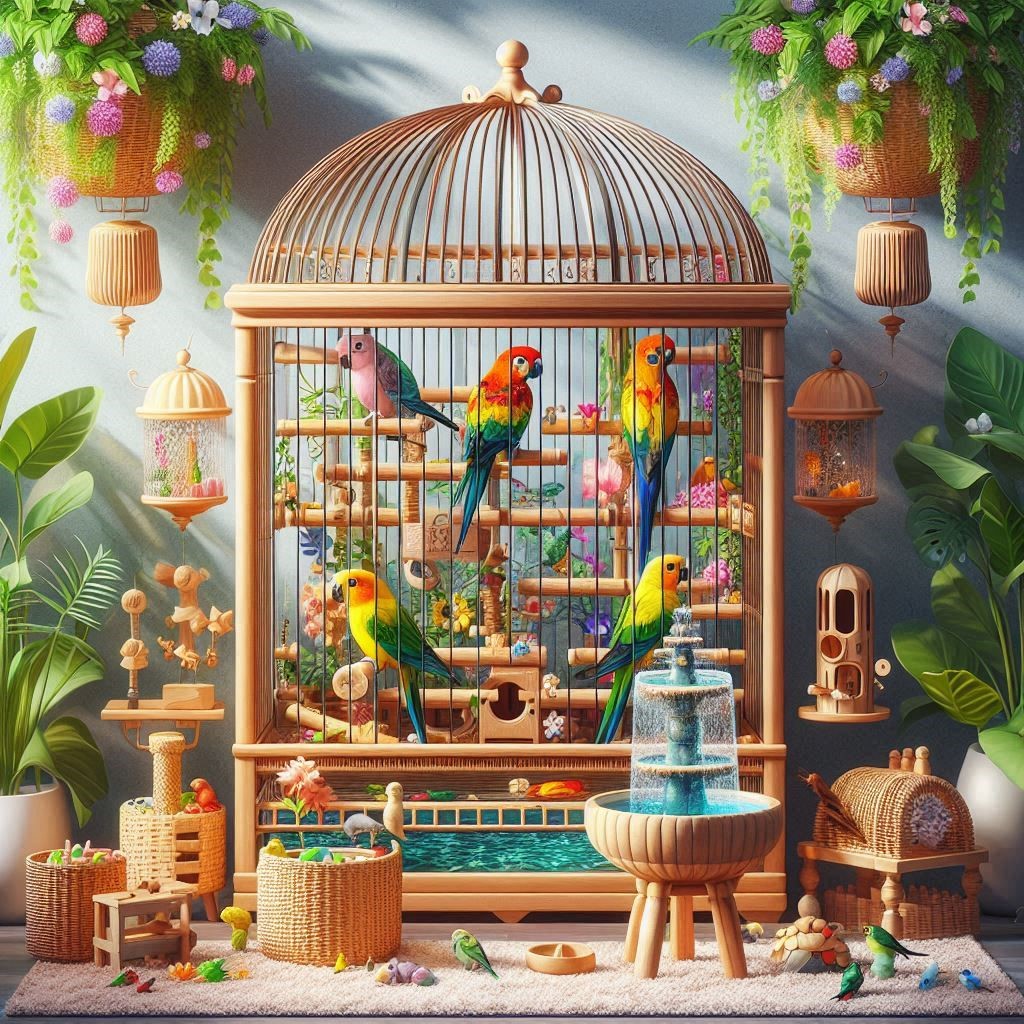Parrots as Pets
Parrots are among the most vibrant and intelligent pets you can bring into your home. With their colorful plumage and playful personalities, they quickly become cherished family members. But when considering adding a feathered friend to your life, one critical question often arises: How long do parrots live as pets? Understanding the lifespan of these remarkable creatures is essential for potential owners, as it helps set realistic expectations for companionship and care.
These birds aren’t just short-term commitments; many species can share your life for decades. Whether you’re drawn in by their charm or intelligence, knowing how long they typically live will guide you in providing them with the best possible environment. Let’s explore what factors contribute to a parrot’s longevity and how you can ensure that your feathery companion thrives throughout its life.
Factors that Affect the Lifespan of Parrots
The lifespan of parrots isn’t just a number; it’s influenced by various factors that every owner should consider. Genetics play a crucial role, as some species are inherently predisposed to longer lives than others.
Diet is another vital aspect. A well-balanced diet rich in fruits, vegetables, and high-quality pellets can significantly improve health and longevity. On the flip side, poor nutrition may lead to diseases that shorten their lifespan.
Environmental conditions also matter. Parrots thrive in clean spaces with proper temperature and humidity levels. Stress from loud noises or sudden changes can negatively impact their well-being.
Regular veterinary care cannot be overlooked either. Routine check-ups help catch potential issues early on, allowing for timely interventions that keep your feathered friend healthy for years.
Social interaction contributes greatly to a parrot’s happiness and lifespan. Those who receive ample attention tend to lead more fulfilling lives compared to isolated companions.
The Different Species of Parrots and their Average Lifespan
Parrots come in a dazzling variety of species, each with its own unique traits and lifespans. The vibrant Macaw can live anywhere from 30 to 50 years, making it one of the longest-living pet birds. Their playful nature and striking colors make them popular companions.
Cockatoos are another fascinating group. These affectionate birds typically have lifespans ranging between 40 and 60 years, depending on their specific type. They thrive on social interaction and require plenty of attention.
Smaller parrot species like Budgerigars or ‘budgies’ may only live around 5 to 10 years. Despite their shorter lifespan, they bring immense joy with their charming personalities.
African Grey parrots stand out for their intelligence and stunning grey feathers. With an average lifespan of about 40 to 60 years, these parrots can form deep bonds with their owners over time. Each species offers a unique companionship experience based on its longevity and needs.
Tips for Increasing the Lifespan of Your Pet Parrot
Providing a balanced diet is crucial. Fresh fruits, vegetables, and high-quality pellets should be staples in their meals. Avoid processed foods and ensure they have access to clean water daily.
Social interaction plays a significant role in a parrot’s well-being. Spend time engaging with your feathered friend through play or training sessions. This strengthens your bond and keeps them mentally stimulated.
Regular veterinary check-ups catch potential health issues early on. Look for avian specialists who understand the unique needs of parrots.
Creating an enriching environment is also vital. Offer toys that promote physical activity and mental engagement. Rotate toys regularly to keep things fresh and exciting.
Maintain a stress-free atmosphere at home. Loud noises or sudden changes can impact their health negatively. A calm environment helps them thrive longer in your care.
Common Health Issues in Parrots and How to Prevent Them
Parrots are vibrant creatures, but they can face health challenges. Common issues include feather plucking, obesity, and respiratory infections.
Feather plucking often arises from stress or boredom. Providing plenty of toys and social interaction is essential for mental stimulation.
Obesity is another major concern. A balanced diet that includes fresh fruits, vegetables, and high-quality pellets will help maintain your parrot’s ideal weight.
Respiratory infections frequently stem from poor air quality or exposure to toxins like smoke or strong chemicals. Ensure proper ventilation in their living space and choose bird-safe cleaning products.
Regular veterinary check-ups play a crucial role in early detection of potential health problems. Staying informed about specific symptoms can make a significant difference too.
By being proactive with care and environment setup, you can help prevent many common ailments that affect our feathery friends.
Creating a Healthy and Happy Environment for Your Pet Parrot
Creating a healthy and happy environment for your pet parrot is essential for their well-being. Start with a spacious cage that allows them to stretch their wings. The size matters, especially since birds are active creatures.
Incorporate natural perches made from untreated wood. This mimics their habitat and provides varied surfaces for their feet. Additionally, include toys that stimulate mental activity—think puzzles or items they can chew on.
Fresh air is vital too; ensure they have time outside the cage in a safe area. Supervised playtime encourages exercise and strengthens your bond.
Maintain cleanliness to prevent diseases. Regularly clean food bowls and change bedding materials.
Consider the ambient noise level in your home. Parrots can be sensitive to loud sounds, so create a calm atmosphere where they feel secure and loved.
From Hatchling to Elder: How Long Do Parrots Live as Pets?
Parrots go through a remarkable journey from hatchlings to vibrant companions. As baby birds, they rely on their parents for warmth and nourishment. This nurturing phase is crucial in shaping their future health.
As they grow, young parrots develop social skills and learn to mimic sounds. Their playful nature often brings joy to families, creating bonds that last a lifetime.
The average lifespan of pet parrots can vary widely based on species and care. Some small breeds live around 10-15 years, while larger species like macaws may thrive for 50 or more years with proper attention.
Understanding this timeline helps owners prepare for the commitment involved in parrot care. Each stage requires different levels of interaction and diet adjustments as your feathered friend matures into its elder years. The aging process is gradual but filled with unique challenges and rewards that deepen the human-parrot connection over time.
The Surprising Lifespan of Pet Parrots: How Long Do They Live?
Parrots often surprise new owners with their impressive lifespans. While many pets have shorter lives, parrots can live for several decades if properly cared for.
Some smaller species, like the budgerigar, may live around 5 to 10 years. In contrast, larger breeds such as macaws or African greys can thrive for up to 50 years or more in a loving environment.
This longevity makes them not just pets but lifelong companions. It’s essential for potential parrot owners to consider this commitment seriously.
Factors influencing lifespan include diet, habitat, and social interaction. A well-balanced diet rich in fruits, vegetables, and seeds is crucial.
Moreover, mental stimulation through toys and regular engagement enhances their quality of life significantly. Understanding these aspects ensures that your feathery friend will thrive alongside you for many joyful years ahead.
Caring for Longevity: How Long Do Parrots Live as Pets?
Caring for your parrot requires commitment and understanding. Their longevity is often a reflection of the love and attention they receive.
A balanced diet is crucial. Fresh fruits, vegetables, grains, and pellets should be staples in their meals. Avoid processed foods to keep them fit and healthy.
Mental stimulation plays a vital role too. Engage your parrot with toys, puzzles, and training sessions to prevent boredom. A happy bird tends to thrive longer.
Social interaction cannot be overlooked. Parrots are social creatures that enjoy companionship. Spend quality time with them daily to strengthen your bond.
Regular veterinary check-ups help catch potential health issues early on. Preventative care can significantly influence their lifespan.
Creating an enriched environment filled with perches, swings, and safe areas for exploration will keep your pet active mentally and physically for years to come.
Parrot Lifespan: How Long Do Parrots Live as Pets?
When considering a parrot as a pet, understanding their lifespan is crucial. Many species exhibit remarkable longevity, often living for decades.
For instance, small parrots like budgerigars can live around 5 to 10 years. Meanwhile, larger breeds such as macaws may reach impressive ages of 50 years or more in captivity.
The environment and care provided significantly impact these figures. With proper nutrition and mental stimulation, many parrot owners witness their feathery companions thriving well into old age.
It’s fascinating how these birds form deep bonds with their humans over the years. Their playful nature and intelligence only deepen this connection as time goes on.
When you welcome a parrot into your life, you’re not just gaining a pet; you’re gaining a lifelong friend who will be part of your family for generations to come.

Your Feathery Friends: How Long Do Parrots Live as Pets?
Owning a parrot can be one of the most fulfilling experiences, but it’s essential to understand their lifespan. Many pet owners are surprised to learn just how long these birds can live. Depending on the species, parrots can have lifespans that range from 15 years to well over 50 years.
Consider this: adopting a parrot is similar to bringing a new family member into your home. Their longevity means you’ll likely share many joyful moments together throughout the years. This bond requires commitment and care, as each stage of their life presents unique challenges and rewards.
When you choose a parrot as your feathered friend, you’re choosing companionship for decades ahead. By prioritizing their health through proper diet, regular veterinary check-ups, and mental stimulation, you give them the best chance at living longer.
Understanding how long parrots live as pets isn’t just about numbers; it’s about preparing for an enriching relationship filled with chirps and cuddles for many years to come. Embrace this journey with your vibrant companion—it’s bound to be an unforgettable adventure!







